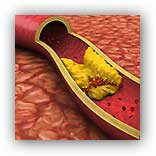|
Intraneural accumulation of misfolded proteins is a
common feature of several neurodegenerative
pathologies including Alzheimerís and Parkinsonís
diseases, and Familial Encephalopathy with
Neuroserpin Inclusion Bodies (FENIB).

FENIB is a rare disease due to a point mutation in
neuroserpin which accelerates protein aggregation in
the endoplasmic reticulum (ER).
Researchers have shown that cholesterol depletion
induced either by prolonged exposure to statins or
by inhibiting the sterol regulatory binding-element
protein (SREBP) pathway also enhances aggregation of
neuroserpin proteins.
These findings can be explained considering a
computational model of protein aggregation under
non-equilibrium conditions, where a decrease in the
rate of protein clearance improves aggregation.
Decreasing cholesterol in cell membranes affects
their biophysical properties, including their
ability to form the vesicles needed for protein
clearance, as we illustrate by a simple mathematical
model.
Taken together, these results suggest that
cholesterol reduction induces neuroserpin
aggregation, even in absence of specific neuroserpin
mutations.
The new mechanism researchers uncovered could be
relevant also for other neurodegenerative diseases
associated with protein aggregation.
See
also:
Fat influences production and survival of brain
cells (2013-01-02)
Link...
Study finds link between commonly prescribed statin
and memory impairment (2013-10-17)
Link...
Parkinsonís Protein May Regulate Fat Metabolism
(20/01/2012)
Link...
For more information
Scientific reports
Cholesterol impairment contributes to neuroserpin
aggregation
Link...
Universitŗ degli studi di Milano
Link...
MDN |